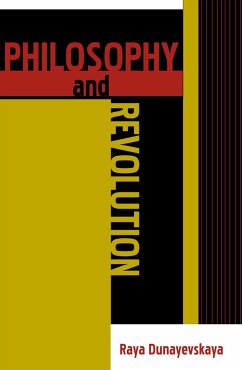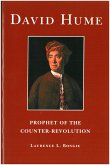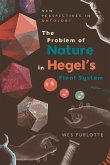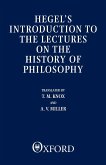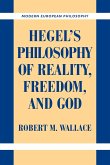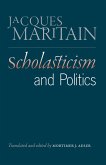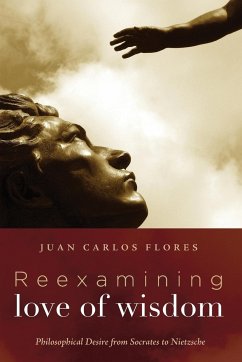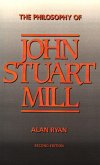Philosophy and Revolution
From Hegel to Sartre, and from Marx to Mao
Herausgeber: Dunayevskaya, Raya
Philosophy and Revolution
From Hegel to Sartre, and from Marx to Mao
Herausgeber: Dunayevskaya, Raya
- Broschiertes Buch
- Merkliste
- Auf die Merkliste
- Bewerten Bewerten
- Teilen
- Produkt teilen
- Produkterinnerung
- Produkterinnerung
Few thought systems have been as distorted and sometimes misconstrued as those of Marx and Hegel. Philosophy and Revolution, presented here in a new edition, attempts to save Marx from interpretations which restrict the revolutionary significance of the philosophy behind his theory. Developing her breakthrough on Hegel's Absolute Idea, Raya Dunayevskaya, who died in the June of 1987, aims at a total liberation of the human person--not only from the ills of a capitalist society, but also from the equally oppressive state capitalism of established communist governments.
Andere Kunden interessierten sich auch für
![David Hume: Prophet of the Counter-Revolution David Hume: Prophet of the Counter-Revolution]() Laurence L BongieDavid Hume: Prophet of the Counter-Revolution12,99 €
Laurence L BongieDavid Hume: Prophet of the Counter-Revolution12,99 €![The Problem of Nature in Hegel's Final System The Problem of Nature in Hegel's Final System]() Wes FurlotteThe Problem of Nature in Hegel's Final System42,99 €
Wes FurlotteThe Problem of Nature in Hegel's Final System42,99 €![Hegel's Introduction to the Lectures on the History of Philosophy Hegel's Introduction to the Lectures on the History of Philosophy]() Georg Wilhelm Friedrich HegelHegel's Introduction to the Lectures on the History of Philosophy61,99 €
Georg Wilhelm Friedrich HegelHegel's Introduction to the Lectures on the History of Philosophy61,99 €![Hegel's Philosophy of Reality, Freedom, and God Hegel's Philosophy of Reality, Freedom, and God]() Robert M. WallaceHegel's Philosophy of Reality, Freedom, and God60,99 €
Robert M. WallaceHegel's Philosophy of Reality, Freedom, and God60,99 €![Scholasticism and Politics Scholasticism and Politics]() Jacques MaritainScholasticism and Politics15,99 €
Jacques MaritainScholasticism and Politics15,99 €![Reexamining Love of Wisdom Reexamining Love of Wisdom]() Juan Carlos FloresReexamining Love of Wisdom23,99 €
Juan Carlos FloresReexamining Love of Wisdom23,99 €![The Philosophy of John Stuart Mill The Philosophy of John Stuart Mill]() Alan RyanThe Philosophy of John Stuart Mill36,99 €
Alan RyanThe Philosophy of John Stuart Mill36,99 €-
-
-
Few thought systems have been as distorted and sometimes misconstrued as those of Marx and Hegel. Philosophy and Revolution, presented here in a new edition, attempts to save Marx from interpretations which restrict the revolutionary significance of the philosophy behind his theory. Developing her breakthrough on Hegel's Absolute Idea, Raya Dunayevskaya, who died in the June of 1987, aims at a total liberation of the human person--not only from the ills of a capitalist society, but also from the equally oppressive state capitalism of established communist governments.
Hinweis: Dieser Artikel kann nur an eine deutsche Lieferadresse ausgeliefert werden.
Hinweis: Dieser Artikel kann nur an eine deutsche Lieferadresse ausgeliefert werden.
Produktdetails
- Produktdetails
- Verlag: Lexington Books
- Seitenzahl: 424
- Erscheinungstermin: 22. Februar 2003
- Englisch
- Abmessung: 213mm x 137mm x 25mm
- Gewicht: 499g
- ISBN-13: 9780739105597
- ISBN-10: 0739105590
- Artikelnr.: 38491420
- Herstellerkennzeichnung
- Libri GmbH
- Europaallee 1
- 36244 Bad Hersfeld
- gpsr@libri.de
- Verlag: Lexington Books
- Seitenzahl: 424
- Erscheinungstermin: 22. Februar 2003
- Englisch
- Abmessung: 213mm x 137mm x 25mm
- Gewicht: 499g
- ISBN-13: 9780739105597
- ISBN-10: 0739105590
- Artikelnr.: 38491420
- Herstellerkennzeichnung
- Libri GmbH
- Europaallee 1
- 36244 Bad Hersfeld
- gpsr@libri.de
Raya Dunayevskaya, who died in June 1987, was the founder of Marxist Humanism in the United States. Philosophy and Revolution is the second work of what the author called her "trilogy of revolution." These works represent the development of her 1953 breakthrough on Hegel's Absolute Idea, when she saw within the Absolute Idea a movement from practice as a well as a movement from theory. She perceived this unity as a vision of a new human society.
Part 1 Why Hegel? Why Now? The Ceaseless Movement of Ideas and of History
Chapter 2 The Phenomenology of Mind, or Experiences of Consciousness
Chapter 3 The Science of Logic, or Attitudes to Objectivity Chapter 4 The
Philosophy of Mind: A Movement from Practice Chapter 5 A New Continent of
Thought: Marx's Historical Materialism and Its Inseparability from the
Hegelian Dialetic Chapter 6 The 1840s: Birth of Historical Materialism
Chapter 7 The 1850s: The Grundrisse, Then and Now: 1. "Progressive Epochs
of Social Formations" 2. The "Automaton" and the Worker Chapter 8 The
Adventures of the Commodity as Fetish Chapter 9 The Shock of Recognition
and the Philosophic Ambivalence of Lenin Part 10 Alternatives Chapter 11 On
the Eve of World War II: Depression in the Economy and in Thought Chapter
12 Leon Trotsky as Theoretician Chapter 13 The Theory of Permanent
Revolution Chapter 14 The Nature of the Russian Economy, or Making a Fixed
Particular into a New Universal Chapter 15 Leadership, Leadership Chapter
16 The Thought of Mao Tse-tung Chapter 17 Discontinuities and Continuities:
1. The Sino-Soviet Conflict 2. That Crucial Year 1965 and "The Great
Proletarian Cultural Revolution," 1966-69 Chapter 18 From Contradiction to
Contradiction to Contradiction Chapter 19 Alienation and Revolution: 1.
Hong Kong Interview 2. Sheng Wu-lien: The Challenge from the Left Chapter
20 Jean-Paul Sartre: Outsider Looking In Chapter 21 "The
Progressive-Regressive Method" Chapter 22 The Dialectic and the Fetish Part
23 Economic Reality and the Dialectics of Liberation Chapter 24 The African
Revolutions and the World Economy Chapter 25 Neocolonialism and the
Totality of the World Crisis Chapter 26 New Human Relations or Tragedies
Like Biafra? Chapter 27 State Capitalism and the East European Revolts
Chapter 28 The Movement from Practice Is Itself a Form of Theory Chapter 29
Theory and Theory Chapter 30 Once Again, Praxis and the Quest for
Universality Chapter 31 New Passions and New Forces: The Black Dimension,
the Anti-Vietnam War Youth, Rank-and-File Labor, Women's Liberation
Chapter 2 The Phenomenology of Mind, or Experiences of Consciousness
Chapter 3 The Science of Logic, or Attitudes to Objectivity Chapter 4 The
Philosophy of Mind: A Movement from Practice Chapter 5 A New Continent of
Thought: Marx's Historical Materialism and Its Inseparability from the
Hegelian Dialetic Chapter 6 The 1840s: Birth of Historical Materialism
Chapter 7 The 1850s: The Grundrisse, Then and Now: 1. "Progressive Epochs
of Social Formations" 2. The "Automaton" and the Worker Chapter 8 The
Adventures of the Commodity as Fetish Chapter 9 The Shock of Recognition
and the Philosophic Ambivalence of Lenin Part 10 Alternatives Chapter 11 On
the Eve of World War II: Depression in the Economy and in Thought Chapter
12 Leon Trotsky as Theoretician Chapter 13 The Theory of Permanent
Revolution Chapter 14 The Nature of the Russian Economy, or Making a Fixed
Particular into a New Universal Chapter 15 Leadership, Leadership Chapter
16 The Thought of Mao Tse-tung Chapter 17 Discontinuities and Continuities:
1. The Sino-Soviet Conflict 2. That Crucial Year 1965 and "The Great
Proletarian Cultural Revolution," 1966-69 Chapter 18 From Contradiction to
Contradiction to Contradiction Chapter 19 Alienation and Revolution: 1.
Hong Kong Interview 2. Sheng Wu-lien: The Challenge from the Left Chapter
20 Jean-Paul Sartre: Outsider Looking In Chapter 21 "The
Progressive-Regressive Method" Chapter 22 The Dialectic and the Fetish Part
23 Economic Reality and the Dialectics of Liberation Chapter 24 The African
Revolutions and the World Economy Chapter 25 Neocolonialism and the
Totality of the World Crisis Chapter 26 New Human Relations or Tragedies
Like Biafra? Chapter 27 State Capitalism and the East European Revolts
Chapter 28 The Movement from Practice Is Itself a Form of Theory Chapter 29
Theory and Theory Chapter 30 Once Again, Praxis and the Quest for
Universality Chapter 31 New Passions and New Forces: The Black Dimension,
the Anti-Vietnam War Youth, Rank-and-File Labor, Women's Liberation
Part 1 Why Hegel? Why Now? The Ceaseless Movement of Ideas and of History
Chapter 2 The Phenomenology of Mind, or Experiences of Consciousness
Chapter 3 The Science of Logic, or Attitudes to Objectivity Chapter 4 The
Philosophy of Mind: A Movement from Practice Chapter 5 A New Continent of
Thought: Marx's Historical Materialism and Its Inseparability from the
Hegelian Dialetic Chapter 6 The 1840s: Birth of Historical Materialism
Chapter 7 The 1850s: The Grundrisse, Then and Now: 1. "Progressive Epochs
of Social Formations" 2. The "Automaton" and the Worker Chapter 8 The
Adventures of the Commodity as Fetish Chapter 9 The Shock of Recognition
and the Philosophic Ambivalence of Lenin Part 10 Alternatives Chapter 11 On
the Eve of World War II: Depression in the Economy and in Thought Chapter
12 Leon Trotsky as Theoretician Chapter 13 The Theory of Permanent
Revolution Chapter 14 The Nature of the Russian Economy, or Making a Fixed
Particular into a New Universal Chapter 15 Leadership, Leadership Chapter
16 The Thought of Mao Tse-tung Chapter 17 Discontinuities and Continuities:
1. The Sino-Soviet Conflict 2. That Crucial Year 1965 and "The Great
Proletarian Cultural Revolution," 1966-69 Chapter 18 From Contradiction to
Contradiction to Contradiction Chapter 19 Alienation and Revolution: 1.
Hong Kong Interview 2. Sheng Wu-lien: The Challenge from the Left Chapter
20 Jean-Paul Sartre: Outsider Looking In Chapter 21 "The
Progressive-Regressive Method" Chapter 22 The Dialectic and the Fetish Part
23 Economic Reality and the Dialectics of Liberation Chapter 24 The African
Revolutions and the World Economy Chapter 25 Neocolonialism and the
Totality of the World Crisis Chapter 26 New Human Relations or Tragedies
Like Biafra? Chapter 27 State Capitalism and the East European Revolts
Chapter 28 The Movement from Practice Is Itself a Form of Theory Chapter 29
Theory and Theory Chapter 30 Once Again, Praxis and the Quest for
Universality Chapter 31 New Passions and New Forces: The Black Dimension,
the Anti-Vietnam War Youth, Rank-and-File Labor, Women's Liberation
Chapter 2 The Phenomenology of Mind, or Experiences of Consciousness
Chapter 3 The Science of Logic, or Attitudes to Objectivity Chapter 4 The
Philosophy of Mind: A Movement from Practice Chapter 5 A New Continent of
Thought: Marx's Historical Materialism and Its Inseparability from the
Hegelian Dialetic Chapter 6 The 1840s: Birth of Historical Materialism
Chapter 7 The 1850s: The Grundrisse, Then and Now: 1. "Progressive Epochs
of Social Formations" 2. The "Automaton" and the Worker Chapter 8 The
Adventures of the Commodity as Fetish Chapter 9 The Shock of Recognition
and the Philosophic Ambivalence of Lenin Part 10 Alternatives Chapter 11 On
the Eve of World War II: Depression in the Economy and in Thought Chapter
12 Leon Trotsky as Theoretician Chapter 13 The Theory of Permanent
Revolution Chapter 14 The Nature of the Russian Economy, or Making a Fixed
Particular into a New Universal Chapter 15 Leadership, Leadership Chapter
16 The Thought of Mao Tse-tung Chapter 17 Discontinuities and Continuities:
1. The Sino-Soviet Conflict 2. That Crucial Year 1965 and "The Great
Proletarian Cultural Revolution," 1966-69 Chapter 18 From Contradiction to
Contradiction to Contradiction Chapter 19 Alienation and Revolution: 1.
Hong Kong Interview 2. Sheng Wu-lien: The Challenge from the Left Chapter
20 Jean-Paul Sartre: Outsider Looking In Chapter 21 "The
Progressive-Regressive Method" Chapter 22 The Dialectic and the Fetish Part
23 Economic Reality and the Dialectics of Liberation Chapter 24 The African
Revolutions and the World Economy Chapter 25 Neocolonialism and the
Totality of the World Crisis Chapter 26 New Human Relations or Tragedies
Like Biafra? Chapter 27 State Capitalism and the East European Revolts
Chapter 28 The Movement from Practice Is Itself a Form of Theory Chapter 29
Theory and Theory Chapter 30 Once Again, Praxis and the Quest for
Universality Chapter 31 New Passions and New Forces: The Black Dimension,
the Anti-Vietnam War Youth, Rank-and-File Labor, Women's Liberation

